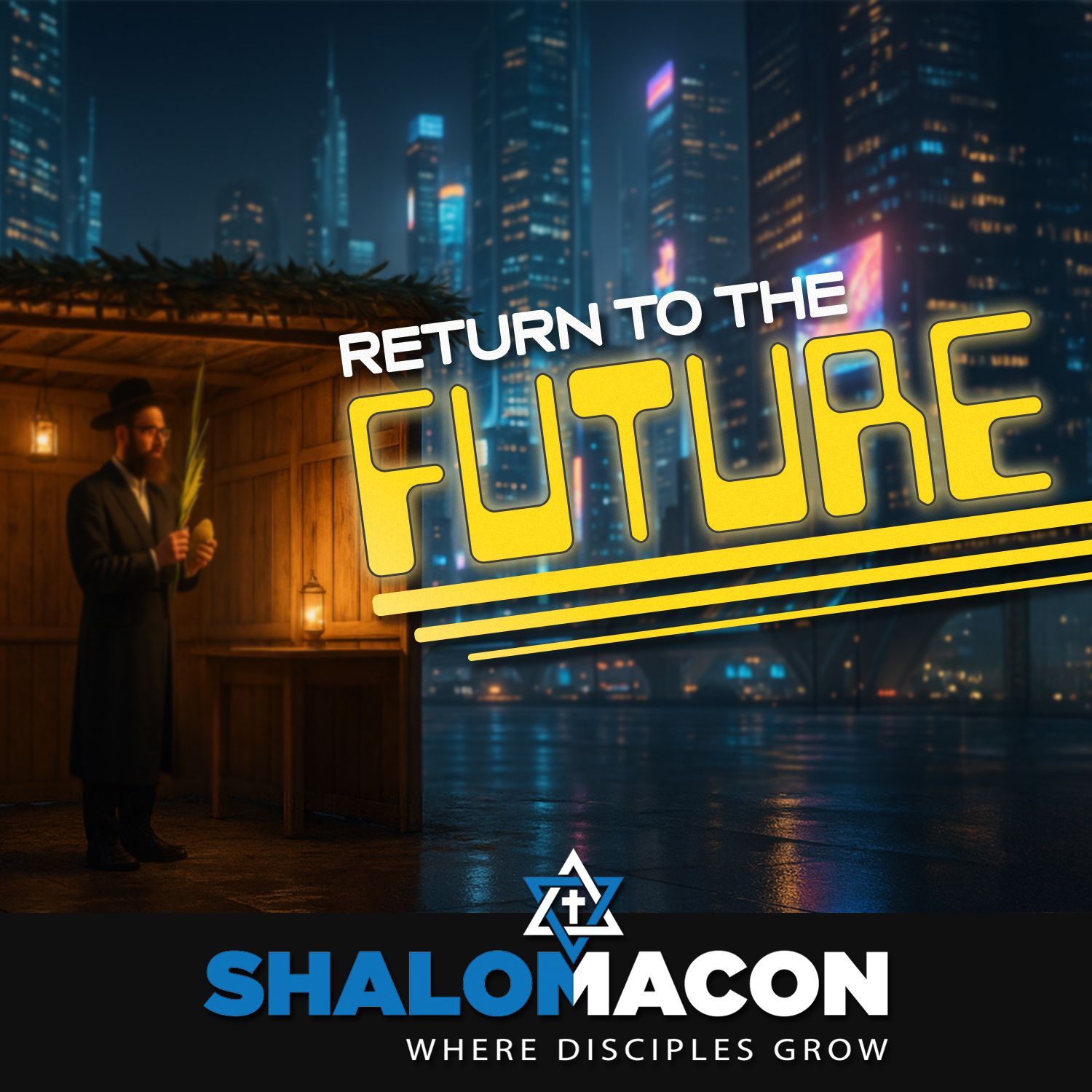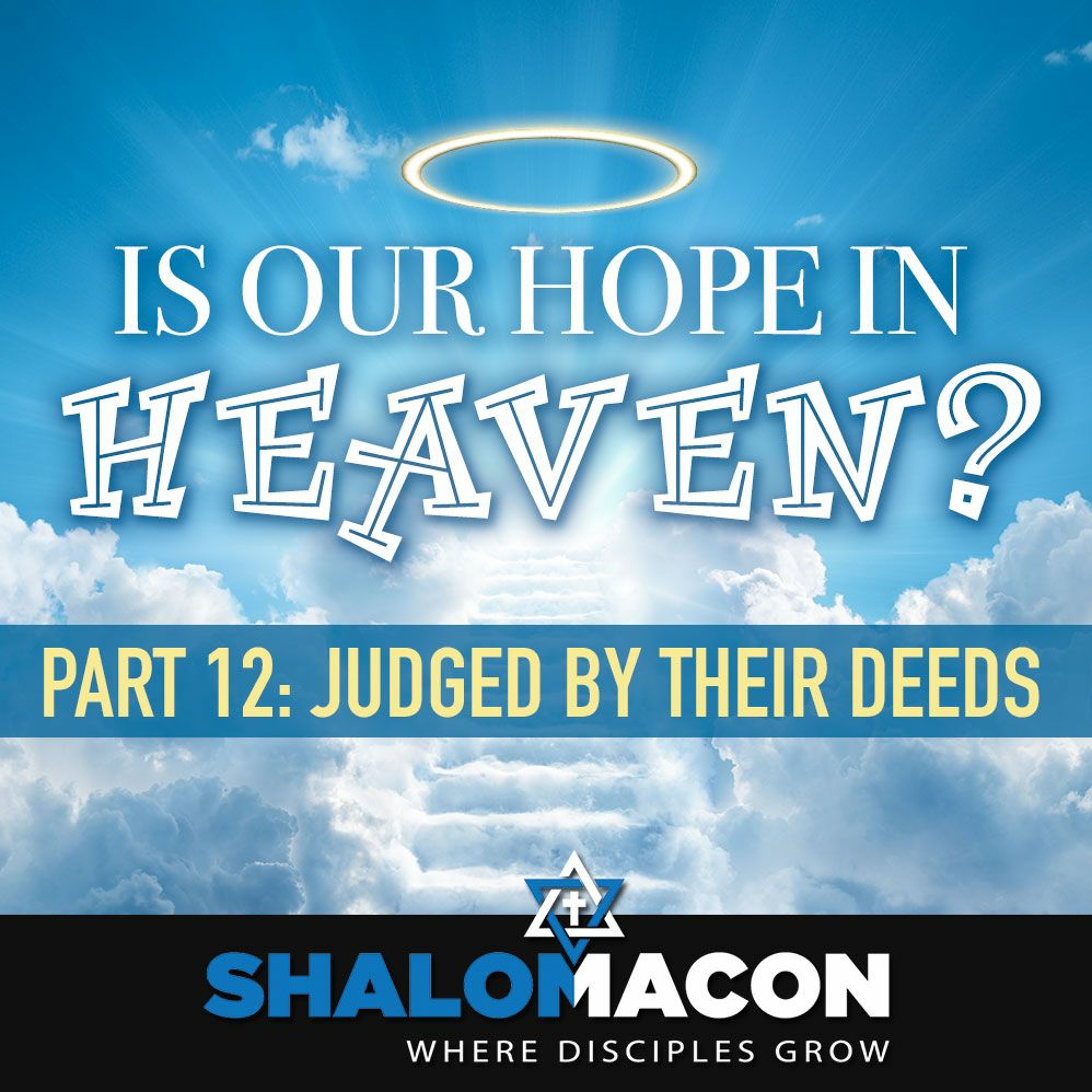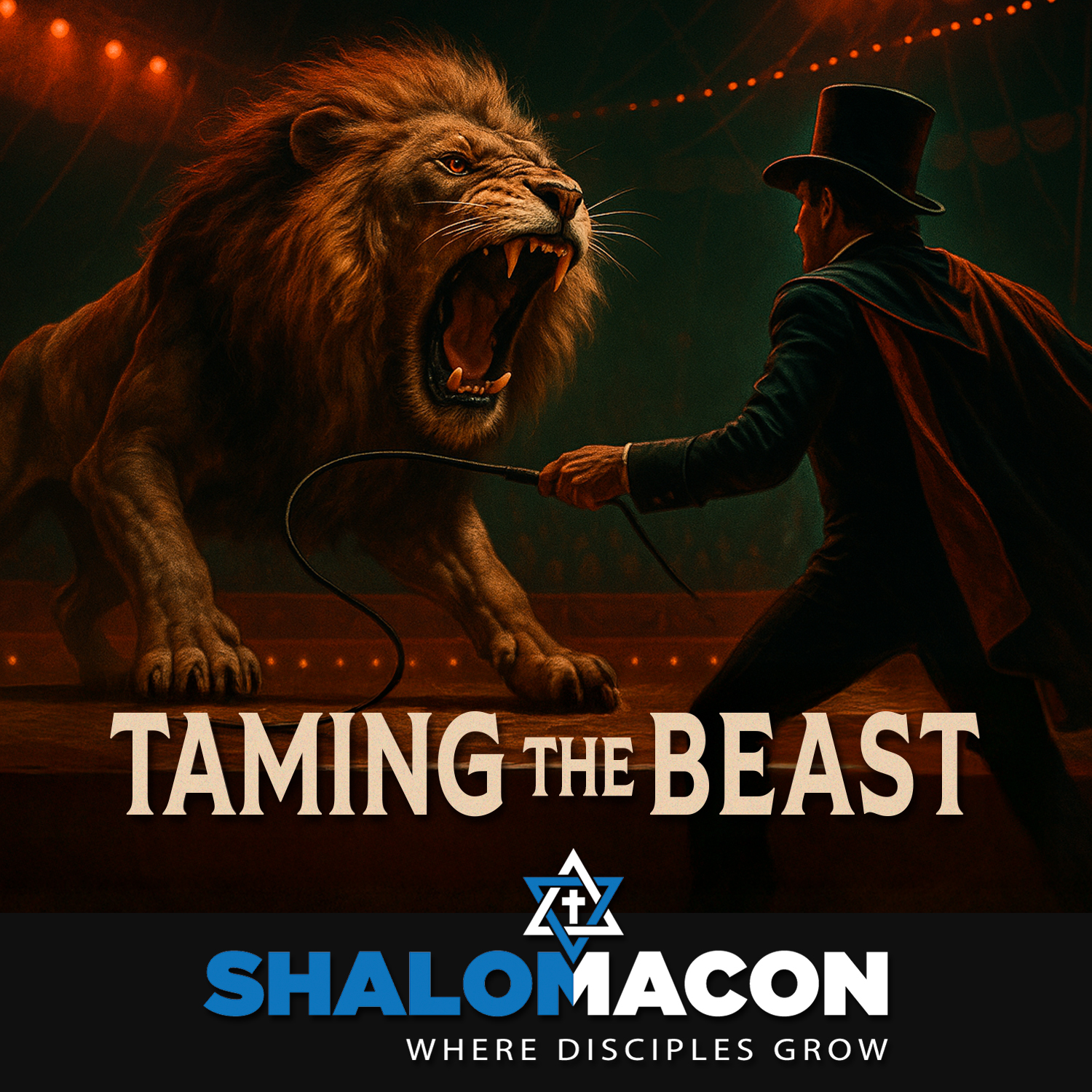Episode Transcript
[00:00:05] Six months ago, I spoke to you about escaping Pharaoh's Matrix, the theme of Passover, exiting our own personal Egypt, and confronting the Pharaoh within our lives. The evil inclination. However, today I want to speak to you about the High Holidays, in particular Sukkot. The theme all throughout the High Holidays in the month of Elul in preparation for them is Teshuvah, or repentance. We hear this English word, repentance often, but this word doesn't quite embody what teshuvah means. Or is Teshuvah truly means to return? It is during this time of the year that we return to Hashem. But what is this returning to Hashem really about? What does that really mean? To find out, we need to look into the past. Back to Pharaoh's Matrix in Egypt. The Torah details the three Shelosh Regalim, the pilgrim festivals that Hashem expected all male Israelites to appear before him at the Holy Temple in Jerusalem. And they are Pesach, Shavuot and Sukkot. We know Pesach or Passover, remembering the exodus from the Matrix of Egypt occurs in the spring, 50 days later, leading to Shavuot, when Hashem gave the Torah and raised the consciousness and awareness of the Israelites to that of Adam before his sin.
[00:01:24] And then Sukkot is in the fall. It is interesting that Sukkot is celebrated as a memorial of the Exodus from Egypt, yet it's at the very opposite point on the Hebrew calendar from when the children of Israel departed from Egypt. Why is this the case?
[00:01:41] The sages have noted that it was on Sukkot when the clouds of glory returned and the construction of the Tabernacle began. This is also when King Solomon inaugurated the first holy temple. The. But there seems to be something that's a bit off. While these were important dates in Jewish history, they are not even close to the monumental instances of the exodus from Egypt. The splitting of the Sea of Reeds and the revelation of Hashem and giving of the Torah on Mount Sinai. These events were unlike anything the world has ever seen, however. But Sukkot, the season of our joy, literally the most joyful time of the year, does not have such a moment in the Torah, at least not on the surface. So let's dive deeper. We know when speaking on and celebrating Passover each year on the Seder Night, we are commanded to retell the story not only as a past event, but also as if we are presently coming out of Egypt. With Pesach, we are reaching into the past and bringing it forward into the present day. With Shavuot, the giving of the Torah and the pouring out of the Holy Spirit.
[00:02:50] This represents our present as the Jewish understanding is that Hashem's voice has always been emanating from Sinai since the Torah was given. And if we will quiet the busyness of our lives, we can hear that still small voice constantly uttering the words of life. I am Hashem, your God, who brought you out of the land of Egypt. But Sukkot, this is the holiday of the future, one that we have yet to actually fully realize. This is the holiday of the Messianic redemption, the wedding banquet of the future world. The destruction of evil and the final war of Gog and Magog. The beating of the weapons into plowshares. All nations living in peace, accepting the yoke of heaven, of King Messiah Yeshua, and worshiping the one true God. This is time that we will be completely enveloped by Hashem's embrace, embodied by the Sukkah, protected from all the evil that existed throughout human history. Let's now look at this paradigm from another angle. Pesach represents the Jewish people as a newborn nation, their pure, unadulterated selves, little children, so to speak, breaking forth from slavery into freedom. Shavuot represents adulthood with the giving of the Torah. This is when the nation took on the yoke and responsibility of being Hashem's chosen people, continuously refining their character and upholding the Torah. Sukkot, though, represents the future of humanity, when all nations will dwell in the Sukkah of Hashem. So we see this progression. Pesach representing infancy and that of a little child, Shavuot representing adulthood and responsibility, and Sukkot representing not necessarily old age, but rather our future perfected selves, the ultimate version of who we were destined and created to be.
[00:04:54] So let's peer a bit further now into the High Holy Days with the focus of Sukkot in mind.
[00:05:01] During this time of the year, as we stated earlier, our entire focus is on Teshuvah, this idea of returning to Hashem. However, with what we have discussed, we now have unlocked something profound. We are not just returning to Hashem in some sort of vague sense, but rather we are returning to the ultimate selves, the perfected, whole and complete version of ourself that exists in the future.
[00:05:29] The version of yourself that Hashem had in mind when he formed you in your mother's womb, and that version of yourself that Yeshua, through his faithfulness on the cross, was able to see and believe would exist at the future redemption. But you may ask, how do we return to that which has yet to occur. Well, we must look back. We must look back to Passover, envisioning and remembering ourselves as little children, the pure souls we were when we played with toys in the living room, found the beauty and wonder in a flower, ran barefoot through the grass. When our parents carried our sleeping souls out of the car after a long ride home and tucked us into bed at night, we must remember that innocent and purity was there even as we made mistakes or have been done wrong by the world. While we now mature in godly wisdom, we must remember the little child within us is still there.
[00:06:32] So we must bring Passover forward and recognize that we are still that little child. Being born from constriction, we are still that holy soul who has escaped Egypt. We must continuously and consciously integrate that belief with who we are today, the mature human we have become. Through our struggles, darkness and failures, through our victories, wisdom and bright light, we must remember the purity of our souls will always shine. And it is through that work that we will be able to get a taste, a glimpse of our perfected self in Yeshua. Yeshua, being the author and finisher of our faith, our faith, our Emunah, believing that we will be made like him. To believe that version of yourself exists in the Sukkot of the future and that we must constantly return to becoming that future version of ourselves. The version of yourself that you know exists deep within you, sown by the Master, unlocking the pure child that came into this world many years ago and elevating them to the radiant human in which you are certain to become.
[00:07:46] So this Sukkot, when you focus on returning, return to that future self. Do not identify with your brokenness, wounds and shattered self. That is not truly you. Return to the person he knows. You are full of faith, wisdom, knowledge and grace.
[00:08:05] Fearless, embodying truth, walking in victory and humility without impurities, having been tried in the furnace seven times, bridging heaven and earth together. And in this way, we are returning to who we have yet to become, thus drawing our future redemption into our immediate reality.
[00:08:28] But now we must go even deeper.
[00:08:31] At the beginning, I mentioned the Matrix in Egypt and how we had to escape it and what that means for us as we approach the festival of Sukkot, representing our final redemption.
[00:08:43] So maybe we have left Pharaoh's matrix. Maybe we've escaped the life of the past.
[00:08:48] But instead of carrying that purity of our childlike self with us, maybe we are carrying pieces of that Egyptian Matrix still within us. Maybe as we move closer and closer toward Sukkot, the Redemption, we allow ourselves to be debilitated by the memories of Egypt, the sins of our past paralyzing us, and even the darkness of our current struggles that traumatize our ability to envision who we truly are and who we we can become.
[00:09:21] However, we must understand with full faith that without the slavery of Egypt, without being entangled in the matrix of Pharaoh, without all of that backbreaking labor, the mental anguish, the materialism of the flesh, the worship of false ideologies, without the failures and sins of the past, we would never be able to become and actualize our flesh fullest potential and become our future selves.
[00:09:48] We must reframe our past in Egypt in order for us to become who Hashem has destined us to be. We must believe with the utmost faith that due to our past transgressions from those we are able to do Teshuvah and to return to Hashem with an intensity to reach our ultimate potential, that without the original failures, the tasting of the depths of the sea, despair, we would never have been able to reach the heights and levels of yearning for Hashem, giving ourselves completely over to him. We have to reframe the understanding of our past that Hashem was there, guiding us along even when we were unaware of him. He was there when our parents sang us lullabies. He was there when we were little children playing in the yard. He was there when we were first made fun of in elementary school. He was there as we grew and made mistakes as adolescents. He was there when our hearts broke and we fell into darkness and despair. He was there when we chose to follow him and his son. He was there during our greatest and proudest moments.
[00:11:00] He, just as the clouds of glory surrounded the Israelites in their desert wanderings, has been surrounding us, leading us in our wanderings, guiding us to Sukkot, the ultimate clouds of glory and the restoration of all things.
[00:11:16] He wants you to see what he sees. He wants you to draw that perfected self of who you will be into your current reality, thus drawing tastes of the future and the ultimate fulfillment of Sukkot into our lives today. He wants you to draw heaven into earth. That is what will propel you as an individual to reach your fullest potential as well as humanity to reach the redemption. Lastly, though, we must continuously draw down the light of the future Sukkah and we must continue to extract the matrix of Egypt, we continue to carry.
[00:11:56] We have two Pharaoh's Matrix or Hashem's Sukkah.
[00:12:01] One is an unholy infrastructure of demonic forces and the worship of self. The Other is the holy structure of Torah. One is built thinking it is indestructible. The Other is built with faith, made of wood and flimsy vegetation. One weighs down the individual with comfort, materialism and sensual pleasure. The Other elevates with trust divine nature and the breathing in of holy air. One convinces us we are invincible, numbing our pain with delicacies. The Other surrounds us with slowly dying and decaying vegetation, reminding us of the temporary dwelling of life Hashem has gifted us and to make the most of every moment.
[00:12:46] One surrounds us with distractions. The Other surrounds us with the clarity of the Ruach Hakodesh. One surrounds us with false protection, the Other with the clouds of glory and the divine embrace. One causes us to discuss frivolities, speech of no spiritual or eternal consequence or value.
[00:13:04] The Other arouses us to speak blessings, words of Torah and encouragement.
[00:13:10] One desires to abolish Hashem's Torah and kill his Messiah and people. The Other allows us to bring about the Torah's literal fulfillment and to usher in the future Messianic Wedding Feast so as you enter into the Sukkah this year, remember back six months ago the purity you felt at Pesach as you remembered the Exodus, retold the story and tasted the body and blood of Messiah. Remember the journey of the second seven weeks to Sinai, refining your character traits. Remember Shavuot staying up late to study Torah and hearing the chanting of the Ten Commandments. Remember the spiritual work of the summer, the morning and fast of the 9th of AV.
[00:13:55] Remember the joy of Tu bav and the teshuvah you began in Elul. Remember the high holidays to come and all the struggles and all of the victories over those struggles and bring them into the Sukkah with you and even deeper. Think about yourself as a child, how your parents took care of you even before you had memories. Remember your earliest years. Remember the growing up and the difficulties, the heartache and the pains, the brokenness and darkness, and of course the mountaintop moments too. So step into the Sukkah with Lulav in hand and bring all of those moments with you, walking in the full stature of Messiah, actualizing and becoming your best self. And then you can realize that Hashem was with you the whole time and it was all for the good Hag Zamach Sam.



